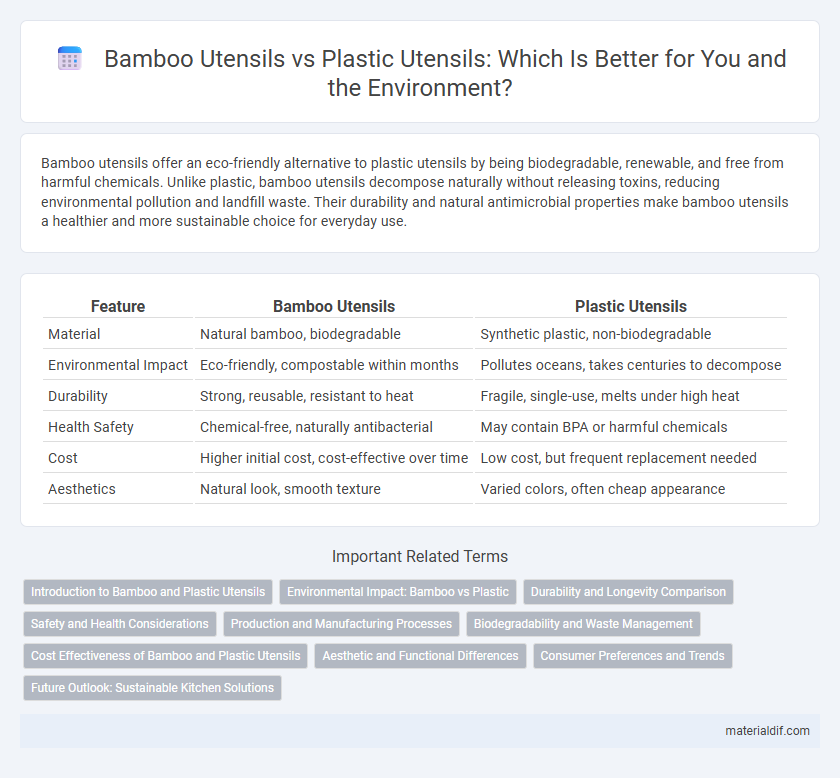Bamboo utensils offer an eco-friendly alternative to plastic utensils by being biodegradable, renewable, and free from harmful chemicals. Unlike plastic, bamboo utensils decompose naturally without releasing toxins, reducing environmental pollution and landfill waste. Their durability and natural antimicrobial properties make bamboo utensils a healthier and more sustainable choice for everyday use.
Table of Comparison
| Feature | Bamboo Utensils | Plastic Utensils |
|---|---|---|
| Material | Natural bamboo, biodegradable | Synthetic plastic, non-biodegradable |
| Environmental Impact | Eco-friendly, compostable within months | Pollutes oceans, takes centuries to decompose |
| Durability | Strong, reusable, resistant to heat | Fragile, single-use, melts under high heat |
| Health Safety | Chemical-free, naturally antibacterial | May contain BPA or harmful chemicals |
| Cost | Higher initial cost, cost-effective over time | Low cost, but frequent replacement needed |
| Aesthetics | Natural look, smooth texture | Varied colors, often cheap appearance |
Introduction to Bamboo and Plastic Utensils
Bamboo utensils, crafted from fast-growing, renewable bamboo grass, offer a sustainable and biodegradable alternative to conventional plastic utensils made from petroleum-based polymers. Plastic utensils dominate due to their low cost and mass production capabilities but contribute significantly to environmental pollution and landfill waste. Bamboo utensils boast natural antimicrobial properties and decompose within months, contrasting sharply with plastic's persistence in ecosystems for hundreds of years.
Environmental Impact: Bamboo vs Plastic
Bamboo utensils significantly reduce environmental impact due to their biodegradability and rapid renewability, as bamboo grows up to 3 feet per day and decomposes naturally within months. In contrast, plastic utensils contribute to pollution by taking hundreds of years to break down, releasing toxic chemicals and microplastics into ecosystems. Choosing bamboo over plastic supports sustainable resource management and reduces landfill waste and ocean contamination.
Durability and Longevity Comparison
Bamboo utensils offer superior durability compared to plastic utensils due to their natural fiber composition, which resists cracking and warping under heat and pressure. Unlike plastic utensils that degrade and become brittle over time, bamboo maintains its structural integrity, making it a longer-lasting and eco-friendly alternative. Their biodegradability further enhances longevity considerations by preventing microplastic pollution common with discarded plastic utensils.
Safety and Health Considerations
Bamboo utensils are naturally antimicrobial, free from harmful chemicals like BPA and phthalates often found in plastic utensils, making them a safer choice for food contact. They are biodegradable and do not leach toxins into food or beverages, preserving health and reducing environmental impact. Plastic utensils, especially single-use types, pose risks of chemical exposure and contribute to pollution, whereas bamboo supports sustainability and safer dining practices.
Production and Manufacturing Processes
Bamboo utensils are produced through sustainable harvesting, involving minimal chemical treatment and low energy consumption, making their manufacturing process eco-friendly and biodegradable. In contrast, plastic utensils rely on petroleum-based polymers, requiring high-energy, complex chemical processing and generating significant carbon emissions and non-biodegradable waste. The renewable nature of bamboo and its efficient, natural growth cycle contribute to a lower environmental impact compared to the synthetic, resource-intensive production of plastic utensils.
Biodegradability and Waste Management
Bamboo utensils decompose naturally within 3 to 6 months, significantly reducing landfill waste compared to plastic utensils, which can take over 400 years to break down. Their biodegradability supports sustainable waste management practices by minimizing microplastic pollution and promoting composting. Utilizing bamboo utensils helps lower environmental impact through efficient recycling and eco-friendly disposal processes.
Cost Effectiveness of Bamboo and Plastic Utensils
Bamboo utensils offer a cost-effective alternative to plastic utensils due to their durability and biodegradability, reducing long-term replacement expenses and waste management costs. Although initial prices for bamboo utensils may be higher, their extended lifespan and eco-friendly disposal make them economically advantageous over time. Plastic utensils often involve lower upfront costs but incur additional environmental cleanup and health-related costs, diminishing their overall cost-effectiveness.
Aesthetic and Functional Differences
Bamboo utensils showcase a natural, rustic aesthetic with smooth textures and warm tones, offering a lightweight yet sturdy alternative to plastic utensils, which often appear mass-produced and lack visual charm. Functionally, bamboo utensils resist heat and do not leach harmful chemicals, making them safer and more durable in hot food environments, while plastic utensils can warp under heat and may release toxins. Bamboo's biodegradable nature also enhances its appeal for eco-friendly lifestyles, contrasting with the environmental burden posed by disposable plastic utensils.
Consumer Preferences and Trends
Consumer preferences increasingly favor bamboo utensils over plastic due to sustainability concerns and biodegradability. Market trends show a growing demand for eco-friendly alternatives, with bamboo's natural antimicrobial properties and aesthetic appeal driving its popularity. Plastic utensils face backlash from environmental regulations and shifting public awareness toward reducing single-use plastics.
Future Outlook: Sustainable Kitchen Solutions
Bamboo utensils offer a renewable and biodegradable alternative to plastic, significantly reducing environmental impact and waste accumulation in landfills. As consumer demand for eco-friendly products grows, the market for bamboo kitchenware is expected to expand rapidly, driven by increased awareness of sustainability and health concerns related to plastic toxins. Innovations in bamboo processing are enhancing durability and affordability, positioning bamboo utensils as a leading solution for sustainable kitchen environments in the future.
Bamboo Utensils vs Plastic Utensils Infographic

 materialdif.com
materialdif.com